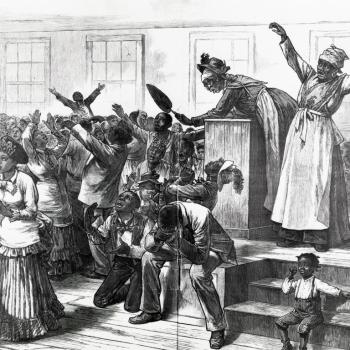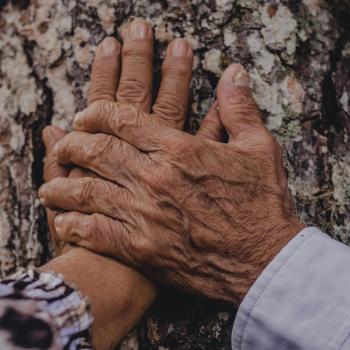Lectionary Reflections
John 21:1-19
April 14, 2013
I led a Sunday School class on Palm Sunday a few weeks ago in which I invited participants to reflect on all the different responses people had to the empty tomb. We looked at the women fleeing in terror and amazement at the end of Mark (16:8). We discussed the women worshiping at the Risen Lord's feet in Matthew 28:9. We described them running to tell the disciples at the end of Luke (Lk 24:8). Finally, we came to the foot race between the beloved disciple and Simon Peter in John's gospel. The more aerobically fit "beloved disciple" gets there first, but hovers outside the tomb. Simon Peter arrives second, but bold and brash as usual, goes in and checks it out. "Then the disciples returned to their homes" (Jn 20:10).
I turned to the class and asked, "Why do you think Simon Peter, after making this amazing discovery of the empty tomb, went home?"
One of the men in the class said, with a grin, "He went home to hide from Jesus!"
Everyone laughed.
I had never thought of it that way before. You betray someone three times. You feel terrible, but since they're now dead, all you have to deal with is your guilt. But if they are actually alive, what you have to deal with is them, standing before you, demanding a reckoning.
Some scholars believe that the book of John originally ended with 20:30-31.
These verses mention "many other signs" Jesus did in the presence of his disciples that are not written in this book. The reference here is unclear. Does "many other signs" refer to signs recorded in a source from which John made key selections? Or does it refer to the miracles and healings recorded in the synoptic gospels? Or is it a broad reference to the "works" of Jesus, which include teachings as well as miracles? We're not sure what signs he refers to that he has not chosen to write down, but we are sure of his purpose in the events and teachings of the prior 20 chapters that he did choose to write down. His purpose is that those who already believe may be strengthened in their faith, and those who do not yet believe may come to belief.
Peter may have preferred it if the gospel had ended with John 20:30-31. If it had, his last two experiences with Jesus would have been in the safety of groups. In John 20:19-23, he could have gotten lost in the crowd as the Risen Lord passed through walls and proclaimed, "Peace be with you." In 20:24-29, he could have been a mere bystander as the Risen Lord dealt with the doubts of Thomas and chided him for them.
If the gospel had ended with 20:31, Peter could have breathed a sigh of relief at dodging the bullet of having to face the one he had betrayed and look him in the eye. But the gospel of John, as it has been handed down to us, continues with a series of interlocking scenes. First, Jesus appears to seven disciples at the Sea of Tiberias and serves them breakfast. Then, after breakfast Jesus badgers Simon Peter with a thrice-repeated question, "Do you love me?" Finally, Peter questions Jesus about the role and future of the beloved disciple (Jn 21:21-23).
Peter doesn't know what lies ahead when he goes to the Sea of Tiberias and says, "I am going fishing." He may have been filled with a combined feeling of relief and grief, thinking to himself, "Well, he's alive in some strange way, and he doesn't seem to be angry with me, but it seems like my relationship with him is dead. What else is left for me, but to go back to who I was and what I used to do?"
He was unprepared for breakfast on the beach with the Risen Lord. The spotlight in this scene is on Simon Peter and Jesus. Simon Peter is the one who instigates the fishing expedition. The others had no more sense of direction or purpose than he did, so they went along (Jn 21:3, 4).
The beloved disciple recognizes Jesus as the one who is standing on the beach giving them instructions. Simon Peter's response is telling. He doesn't want to be naked before the Lord. So he throws on some clothes and jumps into the sea. Wouldn't one action or the other have been enough to cover his nakedness?
There are odd gaps in the story, too. It's not written like a modern-day novel. What is Simon Peter doing while he eats? Does he look down, ashamed to meet Jesus' eyes? Does he have any appetite at all? Does he stand by the fire to warm himself in his wet clothes?
When Jesus is finished grilling the fish and bread for breakfast, it's time for him to grill Peter. When Jesus questions Peter three times about his loyalty, John gives us a rare detail about Peter's emotions. "Peter felt hurt because he said to him the third time, 'Do you love me?'" I suppose he felt two times were justified, but not three. Of course, he didn't limit himself to denying Jesus twice. One commentator calls this conversation "Peter's rehabilitation and commissioning." "Do you love me?" and, if so, "Feed my lambs" (Brown, 1065).





